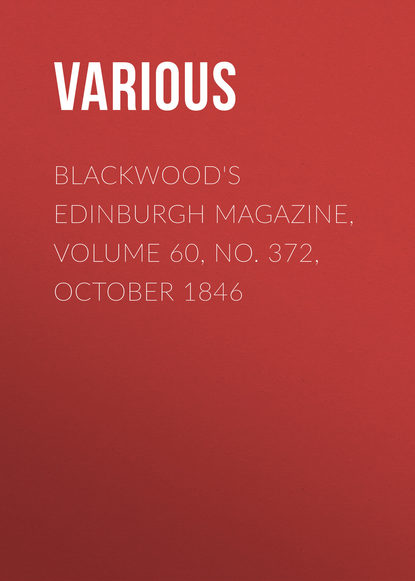По всем вопросам обращайтесь на: info@litportal.ru
(©) 2003-2024.
✖
Blackwood's Edinburgh Magazine, Volume 60, No. 372, October 1846
Автор
Год написания книги
2017
Настройки чтения
Размер шрифта
Высота строк
Поля
When De Balzac's drama, Les Expédients de Quinola, was brought out at the "Odeon," he compounded to receive the proceeds of the first three nights, in lieu of a share of each representation whilst the piece should run. The play had been greatly talked of, the steam had been got up in every way, and the public was in a fever. It is customary enough in Paris for dramatic authors, in order at once to get paid for their labours, to barter their droits d'auteur for the entire profits of the first representations. Scribe does it at the Français. When the tickets are sold at the usual prices, this financial arrangement is regular enough, and concerns nobody but author and manager. But that would not satisfy Balzac, who is notorious for his avarice. He set the brokers to work, and drove the prices up to the highest possible point, fifteen francs for a stall, instead of five, a hundred francs for a box and so forth. "Under such circumstances," says Mr Gutzkow, "it cannot be wondered if people forgot Eugenie Grandet and the Père Goriot, and hissed his play. To-day, nearly a hundred criticisms of Quinola have appeared. It is my belief, that, instead of reading them, Balzac is counting his five-franc pieces." The drama fell from want of merit as well as from the indignation excited by the author's greed. Although Balzac's books are read and admired – some of them at least – personally he is most unpopular. He is accused, and not without reason, of arrogance and avarice. His assumption and conceit are evident in his works. He has sacrificed his fame to love of gold; for one good book he has produced two that are trash; by speculating on his reputation, he has undermined and nearly destroyed it. Moreover, he has committed the enormous blunder of affecting to despise the press, which consequently shows him no mercy. For a fortnight after the appearance of Quinola– which, although defective as a dramatic composition, was not without its merits – the unlucky play served as a daily laughing-stock and whipping-post to the battalion of Parisian critics. Janin led the way; a host of minor wasps followed in his wake, and threw themselves with deafening hum and sharp sting against the devoted head of M. de Balzac. He bore their aggravating assaults with great apparent indifference, consoled for want of friends by well-lined pockets.
At the "Ambigu Comique," Mr Gutzkow attended a performance of the Mousquetaires, a melo-drama founded on Dumas's romance of Vingt Ans Après. Its success was prodigious; it was performed the whole of last winter and spring, upwards of one hundred and fifty nights, always to crowded houses. The novel was dramatised by Dumas himself, with the assistance of one of his literary subordinates, M. Auguste Maquet. One or two of the actors at the "Ambigu" are to form part of the troop at M. Dumas's new theatre, now erecting, and which will open, it is said, this autumn. It is built by a company, and Dumas has engaged to write for it a certain number of plays yearly. The Duke of Montpensier gives it his name.
At the "Ambigu Comique," Mr Gutzkow attended a performance of the Mousquetaires, a melo-drama founded on Dumas's romance of Vingt Ans Après. Its success was prodigious; it was performed the whole of last winter and spring, upwards of one hundred and fifty nights, always to crowded houses. The novel was dramatised by Dumas himself, with the assistance of one of his literary subordinates, M. Auguste Maquet. One or two of the actors at the "Ambigu" are to form part of the troop at M. Dumas's new theatre, now erecting, and which will open, it is said, this autumn. It is built by a company, and Dumas has engaged to write for it a certain number of plays yearly. The Duke of Montpensier gives it his name.











